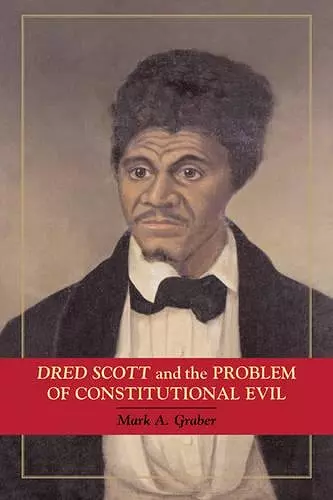Dred Scott and the Problem of Constitutional Evil
Format:Paperback
Publisher:Cambridge University Press
Published:31st Mar '08
Currently unavailable, and unfortunately no date known when it will be back
This paperback is available in another edition too:
- Hardback£33.00(9780521861656)

This 2006 work presents a fresh perspective on the constitutional law surrounding slavery, examining the implications of pledging allegiance to a document that accommodates injustices and challenges the pursuit of human freedom.
Dred Scott and the Problem of Constitutional Evil, published in 2006, presents a fresh perspective on the constitutional law and politics surrounding slavery in the United States. The author examines the decisions made by the Taney Court, particularly the ruling that former slaves could not be considered American citizens and that slavery could not be prohibited in U.S. territories. This interpretation highlights the complexities of the antebellum Constitution and its implications for the nation’s legal framework.
The book delves into the moral dilemmas associated with pledging allegiance to a constitutional text that contains inherent concessions to injustice. The Constitution, as originally conceived, aimed to mediate conflicts among individuals with differing fundamental values, rather than to articulate a clear vision of an ideal society. In crafting a more perfect union with slaveholders, the late-eighteenth-century framers created a document that accepted certain injustices while remaining ambiguous on critical issues of rights and freedoms.
Through its exploration of these themes, Dred Scott and the Problem of Constitutional Evil challenges readers, particularly those committed to the ideals of human freedom, to reflect on the actions of antislavery northerners. It raises important questions about whether they should have made further concessions to slavery to avoid the catastrophic consequences that preceded Lincoln's vision for a new birth of freedom. Ultimately, the book offers a thought-provoking analysis of the constitutional relationship to slavery and its enduring impact on American society.
"In this tough-minded and unstinting tour de force, Mark Graber uses the infamous Dred Scott case to highlight the difficult choices constitutional democracies face when people with radically different views must find ways to live together. By showing how plausible Dred Scott was in its own day, Graber offers a brilliant and sobering meditation on whether, in shaping our constitutional life, we should choose peace over justice." Jack M. Balkin, Yale Law School
"To say that Professor Graber has written an important book is an understatement. No book published in recent years is more illuminating both about the practice of constitutional interpretation and the sometimes pernicious effects of the basic structures of American government established by the Constitution. Every scholar must read this book. More to the point, so should anyone who is concerned with the health of the American polity." Sanford Levinson, University of Texas Law School
"Here is one of the most provocative books on constitutional law you will ever read, about history's most reviled case. Bucking the tide, Graber argues the Supreme Court actually got it right in Dred Scott. Constitutions, Graber explains, often are compromises with the devil. Once made, there are no tricks of constitutional law or interpretation that can make the evil go away." Barry Friedman, New York University School of Law
"Constitutional 'evil' is an unsettling idea. It is a wrenching and embarrassing part of American constitutional history, but it is often painted with a light brush. In this fascinating book, Mark Graber has brilliantly compelled us to do much more. No longer can we ignore evil in our own experience. The emphasis on the Dred Scott case is a superb choice to highlight within the many other examples that are also considered. It provokes us to think about evil in its many forms -- from racial to institutional. It is a powerful solvent against the notion of American exceptionalism." Thomas D. Morris, author of Southern Slavery and the Law, 1619-1860 and Cleveland-Marshall College of Law
"Mark Graber shows that, sadly, the Dred Scott decision's grim affirmation of slavery's constitutionality was an all too reasonable reading of American law. He then poses an even more painful question: whether the Civil War was the best route to eradicating that great constitutional evil. His sobering reflections will stimulate disagreements but also deeper understanding of monumental issues that are very much with us today." Rogers M. Smith, University of Pennsylvania
"...one of the best and most fascinating works of constitutional theory to emerge in the past decade..." The American Prospect , Scott Lemieux
"Dred Scott and the Problem of Constitutional Evil is the most interesting and original book on American constitutionalism that I have read in years." Thomas M. Keck, Maxwell School of Citizenship and Public Affairs, Syracuse University, The Law and Politics Book Review
"this very important work recovers suprisingly significant elements of antebellum constitutional thought. It is relentlessly discomfiting and it forces one to recognize how strongly constitutional evil drove early American political development. It deserves a wide reading." - Richard M. Valelly, Swarthmore College
"This is a sharp and refreshingly realistic book about the limits of constitutional law." - Gerard N. Magliocca, Indiana University School of Law
"Graber offers an interesting, if controversial, approach to understanding constitutional history and the role of both the President and the Supreme Court in constitutional changes." -Council on National Literatures
ISBN: 9780521728577
Dimensions: 235mm x 154mm x 16mm
Weight: 410g
280 pages